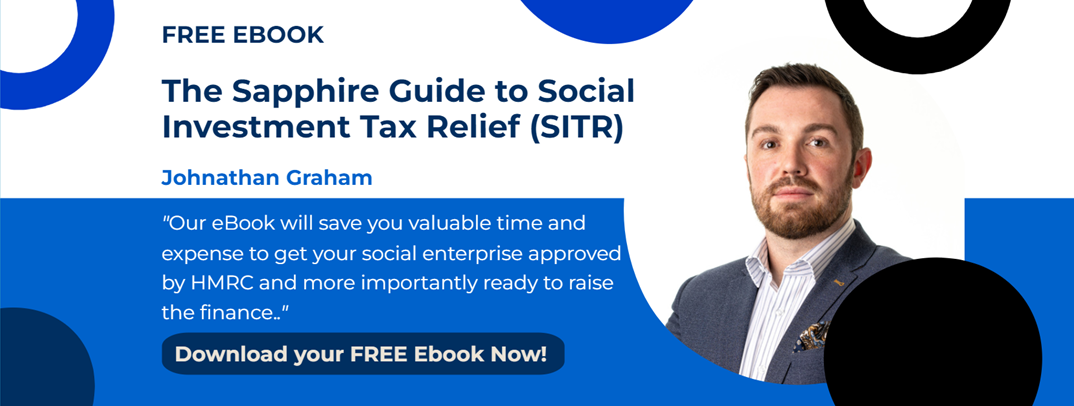 Social Investment Tax Relief (SITR) offers attractive incentives to private investors and will certainly help to attract investment into your start up or established social enterprise. Like the associated schemes, Seed Enterprise Investment Scheme (SEIS) and Enterprise Investment Scheme (EIS) there are restrictions around what type of business will qualify for tax relief. Indeed, a number of excluded activities are common to all of the above mentioned schemes, but there are areas which are different in SITR when compared to SEIS and EIS.
Social Investment Tax Relief (SITR) offers attractive incentives to private investors and will certainly help to attract investment into your start up or established social enterprise. Like the associated schemes, Seed Enterprise Investment Scheme (SEIS) and Enterprise Investment Scheme (EIS) there are restrictions around what type of business will qualify for tax relief. Indeed, a number of excluded activities are common to all of the above mentioned schemes, but there are areas which are different in SITR when compared to SEIS and EIS.
So, what activities are excluded under SITR?
Before we look at the excluded activities it is important to note that exclusions apply to business operations which are wholly, or substantially involved in the trade of 'excluded activities'. HMRC will regard activities as being 'substantial' if they are more than 80% of the whole.
Firstly, let’s look at excluded activities which are common to SEIS, EIS and SITR:
- dealing in land, in commodities or futures, in shares, securities or other financial instruments - this includes circumstances where steps are taken, before selling the land, to make it more attractive to a purchaser.
- banking, insurance, money-lending, debt-factoring, hire-purchase financing or other financial activities.
- property development - this is defined as the development of land in which the company has, or has had, an interest, with the object of realising a gain from the disposal of the land when developed. It includes redevelopment.
- generating or exporting electricity which will attract a Feed-in Tariff. It was previously planned that the generation of renewable energy would qualify for SITR but the 2015 Autumn statement reversed these plans and excluded all energy generation activities from 6 April 2016.
- SEIS and EIS guidance notes ‘farming or market gardening’ as an excluded activity, however under SITR, this category is widened to include the primary production of products listed in Annex I to the Treaty on the Functioning of the European Union. This specifically refers to agriculture, fisheries and trade in agricultural products, with ‘agriculture products’ being defined as products of the soil, of stockfarming and of fisheries and products of first-stage processing directly related to these products.
- providing services to another person where that person's trade consists, to a substantial extent, of excluded activities, and the person controlling that trade also controls the company providing the services. /blog/seis-and-eis-what-trades-are-excluded
 SITR guidance notes other exclusions which are not noted in SEIS and EIS guidance:
SITR guidance notes other exclusions which are not noted in SEIS and EIS guidance:
- activities in the fishery and aquaculture sector (as noted by Council Regulation (EC) No 104/2000 of 17 December 1999).
- road freight transport for hire or reward.
And lastly, those activities not permitted under SEIS and EIS but not specifically excluded under SITR guidance. Please note that this does not mean that they will be treated as a qualifying trade under SITR, as HMRC review every case on an individual basis, but it does mean that they are worthy of consideration.
- Leasing of assets (with the exception of road freight as noted above). Within SEIS and EIS this covers activities such as furnished letting and the letting of holiday caravans, where these activities amount to trading.
- Holding, managing or occupying woodlands, any other forestry activities or timber production.
- Operating or managing hotels or such like, or managing property used as a hotel. Note that there is no established definition of ‘hotel’, and HMRC look to the marketing material, and its treatment by a local authority in determining the type of trade.
- Operating or managing nursing homes or residential care homes or managing property used as a nursing home or residential care home.
The above has been compiled from HRMC guidance, and as such is subject to interpretation, as every business is different. HMRC operate an advance assurance process whereby a business can apply for confirmation that they will qualify under SITR (or SEIS or EIS) before entering into agreements with investors. At Sapphire Capital we work with businesses to assist them with this advance assurance process, thus ensuring that uncertainty is eliminated and giving the investor comfort that their investment into the social enterprise with qualify for SITR.
If you are interested in the advance assurance process, or investing, or attracting investment into your organisation, and would like our help please contact us at Sapphire Capital Partners LLP. We are happy to help.
